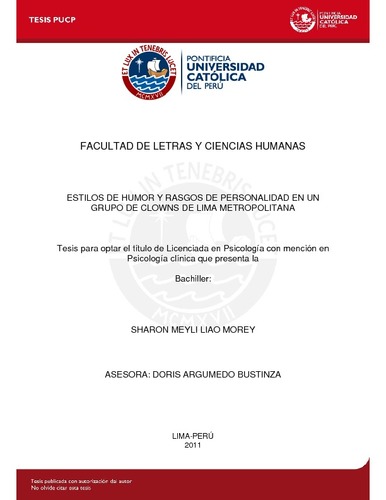| dc.contributor.advisor | Argumedo Bustinza, Doris Julia | es_ES |
| dc.contributor.author | Liao Morey, Sharon Meyli | es_ES |
| dc.date.accessioned | 2013-09-12T16:01:22Z | es_ES |
| dc.date.available | 2013-09-12T16:01:22Z | es_ES |
| dc.date.created | 2012 | es_ES |
| dc.date.issued | 2013-09-12 | es_ES |
| dc.identifier.uri | http://hdl.handle.net/20.500.12404/4762 | |
| dc.description.abstract | Los objetivos de esta investigación consistieron en estudiar los estilos de humor y
los factores de personalidad en un grupo de clowns de Lima Metropolitana, y en
determinar la naturaleza de la relación entre ambas variables. Adicionalmente, estas
variables fueron descritas según el tipo de clown (hospital o escenario), género y edad.
La muestra estuvo constituida en total por 35 clowns y se contó con un grupo de contraste
conformado por 33 actores. Se utilizó una ficha sociodemográfica diseñada para esta
investigación, el Cuestionario de estilos del humor (HSQ) y el Inventario de los cinco
factores de personalidad NEO (NEO-FFI).
Los resultados mostraron que los clowns de hospital parecen tener las cualidades
para llevar a cabo sus actividades de un modo adaptativo, al estar caracterizados por un
uso del humor predominantemente adaptativo y una personalidad equilibrada y llevadera.
Por su parte, los clowns de escenario presentaron un uso relativamente alto de los estilos
desadaptativos de humor, a la par de características de personalidad que tenderían al
Conflicto. | es_ES |
| dc.description.abstract | The research objectives were to study humor styles and personality traits in a
group of clowns in Metropolitan Lima and to determine the nature of the relationship
between both variables. For that purpose, they were described according to clown type
(hospital or stage), gender and age.
Results show that hospital clowns would have the qualities to carry out their activities in an
adjusted way, for they are characterized by a predominantly positive use of humor and an
equilibrated and easygoing personality. On the other hand, the profile outlined for the
stage clown exhibits a relatively high use of maladaptive humor styles and personality
traits that would make them engage in tenuous relationships.
The sample consisted of 35 clowns and a
comparison group of 33 actors. A demographic form designed for this investigation, the
Humor Styles Questionnaire (HSQ) and the NEO Five Factors Inventory of personality
(NEO-FFI) were used for the research. | es_ES |
| dc.language.iso | spa | es_ES |
| dc.publisher | Pontificia Universidad Católica del Perú | es_ES |
| dc.rights | Atribución-NoComercial-SinDerivadas 2.5 Perú | * |
| dc.rights | info:eu-repo/semantics/openAccess | es_ES |
| dc.rights.uri | http://creativecommons.org/licenses/by-nc-nd/2.5/pe/ | * |
| dc.subject | Humor | es_ES |
| dc.subject | Personalidad | es_ES |
| dc.subject | Artes escénicas | es_ES |
| dc.title | Estilos de humor y rasgos de personalidad en un grupo de clowns de Lima Metropolitana | es_ES |
| dc.type | info:eu-repo/semantics/bachelorThesis | es_ES |
| thesis.degree.name | Licenciado en Psicología Clínica | es_ES |
| thesis.degree.level | Título Profesional | es_ES |
| thesis.degree.grantor | Pontificia Universidad Católica del Perú. Facultad de Letras y Ciencias Humanas. | es_ES |
| thesis.degree.discipline | Psicología Clínica | es_ES |
| renati.discipline | 313026 | es_ES |
| renati.level | https://purl.org/pe-repo/renati/level#tituloProfesional | es_ES |
| renati.type | http://purl.org/pe-repo/renati/type#tesis | es_ES |
| dc.publisher.country | PE | es_ES |
| dc.subject.ocde | https://purl.org/pe-repo/ocde/ford#5.01.00 | es_ES |






